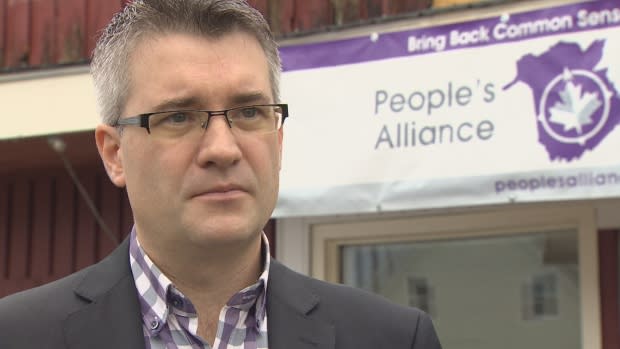People's Alliance leader defends party's notion of language rights
People's Alliance Leader Kris Austin lashed back Tuesday at the acting commissioner of official languages, who has suggested the party has attracted supporters by blaming bilingualism for some of the province's problems.
Austin objected to Michel Carrier's singling out of a political party for criticism.
"I can imagine if the auditor general came out and blasted the Liberal Party about accounting, or the ombudsman come out and question the Conservative party about policy, it would be frowned upon," Austin said Tuesday.
"But yet Mr. Carrier seems OK with coming out and attacking us on language."
Earlier this week, Carrier said some of the messages the People's Alliance is sending aren't "necessarily for equality as far as government services and the way government responds and communicates to its francophone population."
He suggested that after 50 years of official bilingualism, some anglophones still resent the rights confirmed by the Official Languages Act, believe francophones have a better crack at civil service jobs, and question the need for duality in the ambulance service.

"There's still a misunderstanding," Carrier said.
More selective application
Austin said his party, which won three seats in the September election, supports the right of francophones and anglophones to receive services in the language of their choice but takes exception to how and where this right is implemented.
"If you question how taxes are implemented, are you opposed to all taxes?" he asked on Information Morning Fredericton. "If you question how health-care service delivery is given, do you oppose health care?
It can be great in the world of ideologies, but it has to work on the ground, or what's the point? - Kris Austin, People's Alliance leader
"What we're doing is we're simply saying, 'Look we support the right of both French and English in this province but we have serious questions on how it's implemented. I don't know why that's an unfair thing to talk about or discuss."
Although he said his party supports bilingualism, Austin suggested it isn't needed everywhere.
For example, he questioned the need to have separate school buses for francophone students and the need to have bilingual paramedics in areas that are largely unilingual.
Austin said he understands some francophones worry about "assimilation," but that isn't his party's goal.
"They don't want to lose their language and culture, I respect that and I understand that," he said.
"But then you have certain individuals that come out and basically say [taking] a 20-minute school ride on a bus that's not dual busing, somehow kids are going to lose their language, and I'm thinking, 'That's just ridiculous.'"
System needs to be 'reasonable'
Austin said his party supports bilingual paramedics, but it's difficult for paramedics working between 40 and 50 hours a week to learn a second language on the side.
"You've got to be reasonable about this and it's got to make sense," he said. "It can be great in the world of ideologies, but it has to work on the ground, or what's the point?"
He said the problem is reversed for francophone paramedics who struggle with English and can't get full-time work in areas of the province where paramedics are in high demand.
"You can either have unilingual paramedics showing up in 15 minutes, or you can have bilingual paramedics showing up in 45 … I think most New Brunswickers would say, 'Give me the quick response.'"
Would like to meet francophones
Austin said he's open to meeting with Carrier and leaders of the francophone community. But he also said the Alliance won't be budged on what many francophones consider a retreat on official language rights.
"Our opinion is probably not going to change on this," he said. "We're very resolute in how we look at it.
"But again if there's areas where we can make it work better … I'm certainly open to those conversations."

